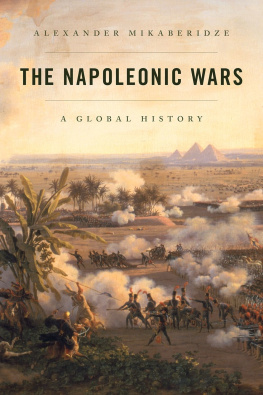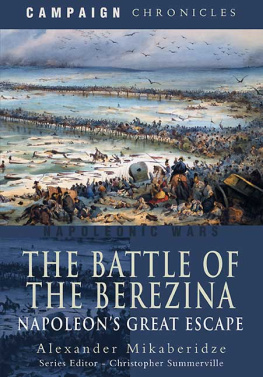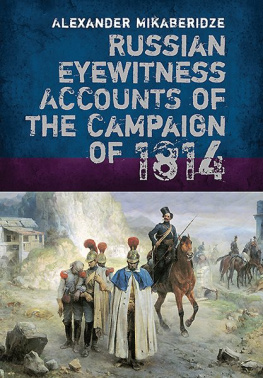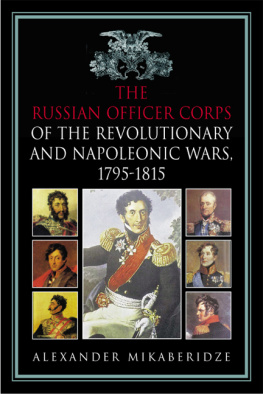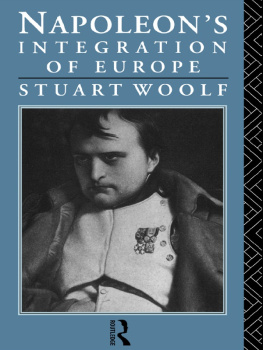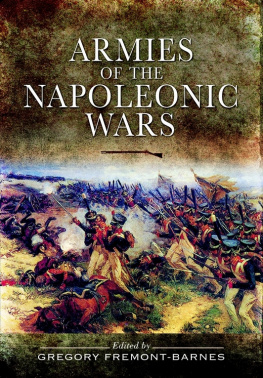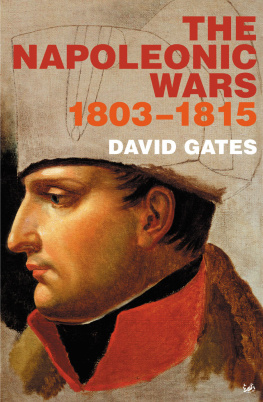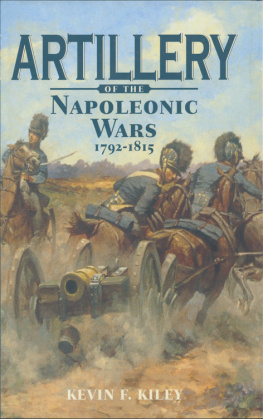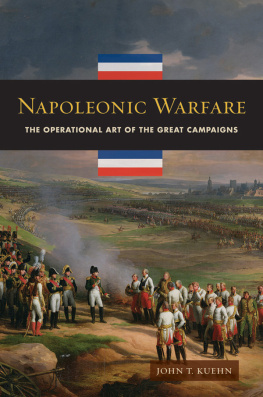The Napoleonic Wars

Oxford University Press is a department of the University of Oxford. It furthers the Universitys objective of excellence in research, scholarship, and education by publishing worldwide. Oxford is a registered trade mark of Oxford University Press in the UK and certain other countries.
Published in the United States of America by Oxford University Press
198 Madison Avenue, New York, NY 10016, United States of America
Alexander Mikaberidze 2020
All rights reserved. No part of this publication may be reproduced, stored in a retrieval system, or transmitted, in any form or by any means, without the prior permission in writing of Oxford University Press, or as expressly permitted by law, by license, or under terms agreed with the appropriate reproduction rights organization. Inquiries concerning reproduction outside the scope of the above should be sent to the Rights Department, Oxford University Press, at the address above.
You must not circulate this work in any other form and you must impose this same condition on any acquirer.
Library of Congress Cataloging-in-Publication Data
Names: Mikaberidze, Alexander, author.
Title: The Napoleonic Wars: a global history/Alexander Mikaberidze.
Description: New York: Oxford University Press, [2020]
Identifiers: LCCN 2019019279 | ISBN 9780199951062 (hardback: alk. paper)| ebook ISBN 9780199394067
Subjects: LCSH: Napoleonic Wars, 18001815. | Napoleonic Wars, 18001815Influence. | GeopoliticsHistory19th century. | Military history, Modern19th century.
Classification: LCC DC226.3 .M54 2020 | DDC 940.2/7dc23 LC record available at https://lccn.loc.gov/2019019279
987654321
Printed by LSC Communications, Inc.
United States of America
For Anna
I am called to change the world.
Napoleon to his brother Joseph
We have won an empire by armed might, and it must continue to rest on armed might, otherwise it will fall by the same means, to a superior power.
Secret Committee of the British East India Company
Now Napoleon, there was a fellow! His life was the stride of a demigod from battle to battle and from victory to victory. It can be said that he was in a permanent state of enlightenment, which is why his fate was more brilliant than the world has ever seen or is likely to see after him.
Johann Wolfgang von Goethe
One man alone was then alive in Europe; everyone else tried to fill their lungs with the air he had breathed. Every year France made him a gift of three hundred thousand young men; and, with a smile, he took this new fiber pulled from the heart of humanity, twisted it in his hands, and made a new string for his bow; he then took one of his arrows and sent it flying across the world, until it fell into a vale on a deserted island under a weeping willow.
Alfred de Musset
History is not the soil in which happiness grows. The periods of happiness in it are the blank pages of history.
Georg Wilhelm Friedrich Hegel
Contents
It has long been accepted that, together with the French Revolutionary Wars, the Napoleonic Wars constitute a single conflict, lasting some twenty-three years, that ranged France against shifting alliances of European powers and produced a short-lived French hegemony over most of Europe. Between 1792 and 1815 Europe was plunged into turmoil and transformation. The French Revolution unleashed a torrent of political, social, cultural, and military changes. Napoleon extended them beyond the countrys frontiers. The ensuing struggle was immense in its scale and intensity. Never before had European states resorted to a mobilization of civilian and military resources as total as during this period. Whats more, this was a contest of great powers on a truly global scale. The Napoleonic Wars were not the first conflict to span the globesuch a distinction probably belongs to the Seven Years War, which Winston Churchill famously labeled as the first world war. But this was a war that in its scale and impact dwarfed all other European conflicts; for nineteenth-century contemporaries, it came to be known as the Great War. Though provoked by the rivalries within Europe, the Napoleonic Wars involved worldwide struggles for colonies and trade, and in scale, reach, and intensity they represent one of the largest conflicts in history. In his efforts to achieve French hegemony, Napoleon indirectly became the architect of independent South America, reshaped the Middle East, strengthened British imperial ambitions, and contributed to the rise of American power.
Starting in the spring of 1792, revolutionary France became embroiled in a war. At first the French aspired to defend their revolutionary gains, but as the war progressed, their armies spread the effects of the Revolution to the neighboring states. With General Napoleon Bonapartes rise to power, Frances war aims reverted to more traditional policies of territorial expansion and continental hegemony seen under the Bourbon kings. Born on the island of Corsica into a noble but impoverished family of Italian descent, Bonaparte studied at French military schools and was commissioned as a lieutenant in the French artillery in 1785. The Revolution, which he welcomed despite his aristocratic roots, opened career prospects that would have been unimaginable to a young captain from a remote outpost of the French Empire. Rising rapidly in the new revolutionary armies, he was given command of French forces to invade Italy in 1796 and won brilliant victories that not only secured northern Italy for France but also helped to end the War of the First Coalition, as is called the first attempt to stop French expansion beyond its borders. Bonapartes next campaign, in Egypt, was a military fiasco that failed to achieve its goals and ultimately resulted in the departure of the French. But it did enhance Bonapartes reputation as a decisive leader, which helped him overthrow the French government in November 1799. By that point, a decade of revolutionary upheaval and uncertainty had made firm rule, and the order and stability that it promised, more enticing than the ideas and promises of radical revolutionaries.
Though youthful (he turned thirty in 1799), the gifted General Bonaparte proved to be a figure of authority. After seizing power in a coup, he assumed the title of First Consul of the Republic and pursued an ambitious domestic policy to stabilize France. The reforms of 18001804 consolidated revolutionary gains, with the famed Napoleonic Code reasserting fundamental principles of the Revolution: equality of all citizens before the law and security of wealth and private property. Neither a revolutionary nor a power-hungry maniac, Bonaparte instead gave France a form of enlightened despotism masked by a faade of democratic ideals. Sovereign power resided only with the ruler, not with the people. Though some scholars describe him as a child of the Revolution, it would be more appropriate to refer to him as a child of the Enlightenment. Bonaparte had little patience for the chaos, confusion, and radical socioeconomic changes that revolutions tend to produce; on several occasions he had openly expressed his disdain for the crowds that played a decisive role in shaping the course of the French Revolution. Instead, Bonaparte felt more comfortable within the traditions that emphasized rationalism and strong political authority as well as tolerance and equality before the law. True to the tenets of enlightened despotism, he strove to build a strong French state by giving the people what he believed they needed, yet never holding out the prospect of embracing republican democracy or surrendering sovereignty to the will of the people.

